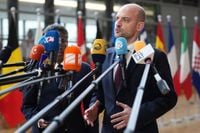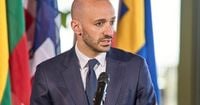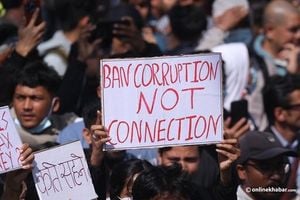For Lennart Monterlos, what began as a bold cycling adventure across continents nearly ended in an Iranian prison cell. The 19-year-old Franco-German cyclist, who set out on an ambitious 400-day journey from Europe to Asia, was arrested in Iran on June 16, 2025, in the southern city of Bandar Abbas. His crime, according to Iranian authorities? Espionage—an accusation that would later be dropped, but not before months of uncertainty, diplomatic maneuvering, and mounting concern from his family and two nations.
Monterlos’s ordeal began as he was nearing the border with Afghanistan, his Iranian visa about to expire. The young traveler, who had been documenting his journey on social media, vanished from public view, prompting alarm among his followers and loved ones. As FRANCE 24 reports, Monterlos had posted on Instagram the day before his arrest, writing: "Am I reckless or brave? You decide in the comments." The next day, he was detained, thrust into the heart of a geopolitical drama that would draw in diplomats at the highest levels.
Iran’s judiciary formally accused Monterlos of espionage, a charge that France swiftly condemned as arbitrary. The French government, along with his parents, campaigned vigorously for his release. "We are relieved that our son will return to us," Monterlos’s parents said in a written statement to AFP through their lawyer, Chirinne Ardakani. Their relief would not be shared by all, as other French nationals remained in Iranian detention under far harsher conditions.
After nearly four months, the tide finally turned. On October 6, 2025, Iranian authorities dropped the charges against Monterlos. He was released from prison over the following weekend and taken in by the French embassy in Tehran, where he awaited the paperwork necessary to leave the country. By October 8, French Foreign Minister Jean-Noël Barrot could finally declare, "Lennart Monterlos is free!"—a message he shared on X (formerly Twitter) and in statements to the press. Sources close to the case confirmed the young man would travel to France on October 9, 2025.
The announcement was met with widespread relief in France. President Emmanuel Macron posted on X: "The nation shares his relief and that of his loved ones. Thank you to all those who worked for this release." Monterlos’s release marks the latest in a string of French nationals freed from Iranian detention in 2025, though others remain behind bars. According to Associated Press, two French citizens, Cécile Kohler and Jacques Paris, have been imprisoned in Iran for more than three years, facing charges that Paris insists are without foundation and conditions that France likens to torture.
The case of Kohler and Paris is particularly fraught. Both were accused of spying for Israel and face the death penalty, a situation that has drawn sharp rebukes from the French government. "I have not forgotten Cécile Kohler and Jacques Paris, whose immediate release we demand," Barrot stated, reiterating France’s stance in the wake of Monterlos’s freedom. The French government maintains that their detention is part of a broader pattern of what it calls "hostage diplomacy"—the use of foreign detainees as bargaining chips in negotiations over nuclear policy, sanctions, and other contentious issues.
Indeed, the shadow of geopolitics looms large over these cases. France, along with several other European countries, suspects that Iran holds as many as 20 Europeans in detention, often under dubious charges. The goal, French officials believe, is to extract concessions from Western governments—whether in the form of prisoner swaps or diplomatic leverage. In September 2025, French authorities even dropped a case before the International Court of Justice (ICJ), which accused Tehran of violating the consular rights of its citizens, in what observers saw as a move to facilitate ongoing negotiations for the release of detainees.
There are signs that these negotiations are bearing fruit. Talks between France and Iran for the release of Kohler, Paris, and others are reportedly progressing. Iranian diplomat Abbas Araghchi indicated last month that a deal was nearing its final stages, and Barrot echoed this optimism, telling the media there were "strong prospects of being able to bring them back in the coming weeks." A potential prisoner swap is on the table, involving Kohler and Paris and Mahdieh Esfandiari, an Iranian woman detained in France since February 2025 on charges of promoting terrorism on social media. While Iran insists that the French couple were spying on behalf of Israel, it calls Esfandiari’s detention arbitrary—a mirror image of the accusations leveled by Paris.
For Monterlos, the end of his ordeal is bittersweet. His journey, which began with dreams of cycling across 35 countries to reach Japan, was cut short in the most dramatic fashion. He had only just finished high school before setting out, propelled by a spirit of adventure and curiosity. The social media posts that once chronicled his travels now stand as a testament to both his resilience and the unpredictable risks of crossing borders in a tense international climate.
Monterlos’s release has also reignited debate in France about the safety of traveling in countries with strained diplomatic relations. While the French government celebrates his safe return, officials are quick to remind citizens of the dangers that can arise in such environments, especially as tensions between Iran and Western nations remain high. The brief war between Iran and Israel, which coincided with Monterlos’s arrest, only heightened suspicions and the likelihood of foreign nationals being swept up in security crackdowns.
As the dust settles, the focus shifts back to those who remain imprisoned. The cases of Kohler and Paris, as well as other European detainees, continue to test the resolve of diplomats and the patience of families. France’s accusations of hostage diplomacy have not gone unnoticed in Tehran, where officials bristle at the suggestion and maintain that their legal processes are fair and legitimate. Yet, for those watching from afar, the pattern is difficult to ignore: Western citizens, often on tourist or business trips, detained on vague or politically charged allegations, their fates tied to the ebb and flow of international negotiations.
Monterlos’s story, then, is not just about one young man’s freedom, but about the complex and often perilous intersection of personal ambition and global politics. His release is cause for celebration, but it is also a stark reminder of the challenges that remain. For now, Monterlos is on his way home, his family waiting with open arms, and a nation breathing a collective sigh of relief. But for others, the wait goes on, and the diplomatic struggle continues.





